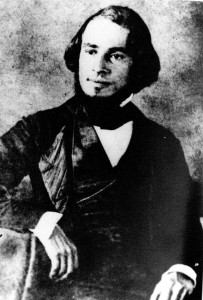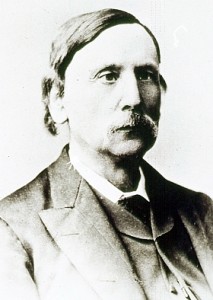The Hebrew Benevolent Society
The Hebrew Benevolent Society was born in Los Angeles in July 1854, at a time when the small pueblo was a dusty and almost lawless place.

Solomon Carvelho, artist & photographer, inspired others to form the Hebrew Benevolent Society, Los Angeles
“The Israelites of this city have formed themselves into a society under the name of the Hebrew Benevolent Society. At a meeting held on the 22nd inst., the following gentlemen were elected officers of the society: S[amuel]. K. Labatt, President, Chas Shachco, Vice President, Jacob Elias, Secretary and Treasurer, S[olomon] Lazard and H. Goldbery, Trustees.”
— The Los Angeles Star, July 8, 1854
The Hebrew Benevolent Society was formed for two purposes: Mutual aid to Jews and others, and to develop a cemetery and burial rites for members of the Jewish faith.
Land for the Jewish cemetery was deeded to the Society by the City of Los Angeles and was located in Chavez Ravine.
The Hebrew Benevolent Society was Los Angeles’ first chartered charity organization.
In 1867, there was a smallpox epidemic in Los Angeles.
The Hebrew Benevolent Society emptied its treasury to feed the stricken.
“Although our society is as its name proclaims a Hebrew Benevolent society . . . yet the report of our secretary will show that we have extended charity, not only to those of our own faith, but to every sect who applies for the same; that the only thing taken into consideration was whether they were worthy of receiving assistance or not; that it made no difference whether the applicant were Jew or gentile, as long as he was in actual need of assistance he invariably received it. This is as it should be, and as I trust, it ever will be.”
— Henry Wartenberg, President of the Hebrew Benevolent Society, July 10, 1870
The Jewish Social Service Bureau
In 1915, the Hebrew Benevolent Society merged with the Ladies Hebrew Benevolent Society.
The first social worker was hired and the name was changed to the Jewish Social Service Bureau.
Jewish Family Service of Los Angeles
After World War II, the organization became the Jewish Family Service of Los Angeles, as it is known today.
“Jewish Family Service of Los Angeles is an extended family of compassionate social services that enriches the community and improves the lives of countless men, women, and children of all religions, ethnicities and ages. For more than 150 years, JFS has counseled families, fed the hungry, sheltered the homeless and protected the vulnerable. As Los Angeles’ oldest and most charitable dynamic organization, JFS is a trusted source of care and support, meeting the diverse and changing needs of a diverse and changing city.”
— from a recent JFS brochure
Along the way . . . .
In 1904, the Society became concerned with the problems of tuberculosis and consumptive care, convincing Kaspare Cohn to purchase a Caroll Avenue house and convert it into a hospital for tubercular patients.
In 1906, the Hebrew Benevolent Society created a subsidiary called the Hebrew Consumptive Relief Association, which eventually grew into the City of Hope in Duarte, California.
In 1911, the Society created the Free Loan Fund.
Sources
- “Hebrew Benevolent Society of Los Angeles, California: Constitution and By-Laws, 1855,” Western States Jewish History 30/2.
- Lee Lainer, “Jewish Family Service of Los Angeles: Historical Reflections of 145 Years of Service,” Western States Jewish History 30/4.
========================================================
“Jews in the News”
Hebrew Incentive for Protestants in Los Angeles — 1855
The Hebrew Benevolent Society — This society, which was organized about one year since, have recently made arrangements to enclose a burial place for their dead, by a good and substantial brick wall. The corner stone was laid on Wednesday, and the work will now proceed rapidly to completion. Whether we regard the enterprise of our Jewish citizens, the spirit displayed by the projectors of the cemetery, or the fraternal feeling it denotes, we think it well entitled to the support of the community.
It is a matter of deep regret with many of our Protestant citizens, that no receptacle for the dead, has been made secure by an enclosure, where their friends who are committed to the silent grave may remain unmolested. We hope this example of the Hebrews will be an incentive to Protestants to take into consideration this important subject, for we presume none will deny that aside from the advantages that will accrue, there is a melancholy pleasure in knowing that the graves of our relatives and friends, are undisturbed.
— Los Angeles Star, Saturday, June 2, 1855 [Western States Jewish Historical Quarterly 2/4]

